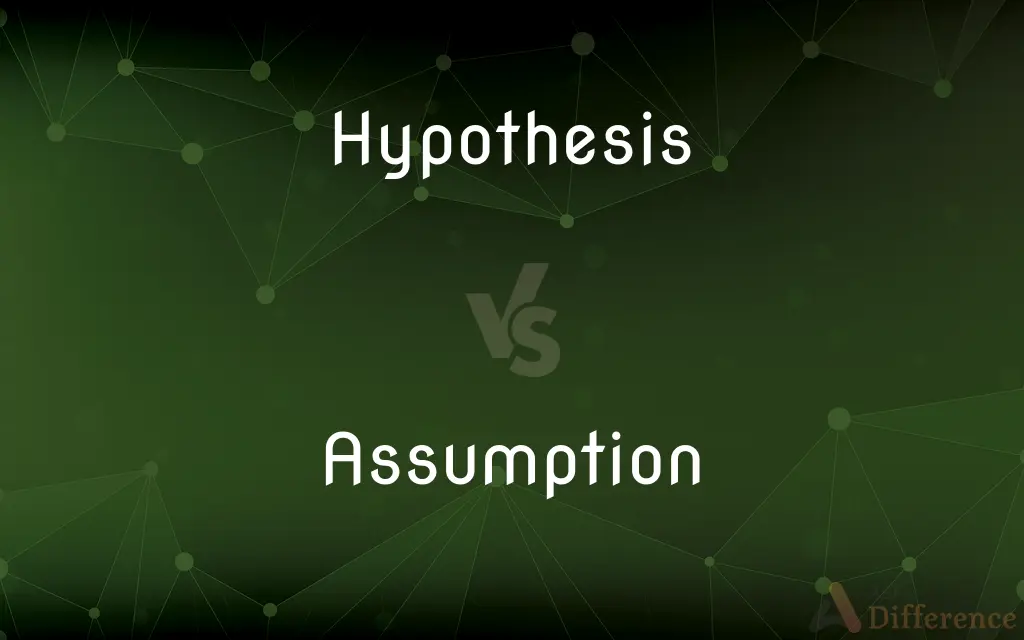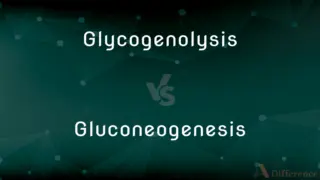Hypothesis vs. Assumption — What's the Difference?
By Tayyaba Rehman — Updated on September 16, 2023
A hypothesis is a testable proposition explaining a phenomenon, while an assumption is a basic premise accepted without direct evidence.

Difference Between Hypothesis and Assumption
Table of Contents
ADVERTISEMENT
Key Differences
A hypothesis typically serves as the foundation for scientific studies. It's an educated guess, based on observation, that can be tested and either confirmed or refuted. In contrast, an assumption acts as an accepted truth or premise that underpins reasoning, often without direct evidence supporting it.
The scientific method relies heavily on hypotheses. Researchers form these testable predictions, and through experimentation, they seek to determine their validity. On the other hand, assumptions are commonly used in both scientific and everyday reasoning to establish a starting point, even if they remain untested.
Hypotheses are often subject to rigorous scrutiny and evolve based on evidence. If data from an experiment doesn't support the hypothesis, it's rejected or modified. Assumptions, conversely, are not typically tested within the context they're used; they're just accepted as given.
While a hypothesis aims to explain or predict phenomena and its accuracy is critical for the outcome of research, an assumption provides a contextual framework for analysis. If an assumption proves incorrect, it can distort conclusions.
Both hypotheses and assumptions play pivotal roles in critical thinking and research. While the former drives inquiry and discovery, the latter simplifies complex scenarios, allowing for meaningful analysis.
ADVERTISEMENT
Comparison Chart
Basis
Observation and prior knowledge
Accepted premise without direct evidence
Testability
Typically testable through experimentation
Generally not tested within context
Use
Scientific research, predictions
Contextual framework, both in science and everyday
Outcome if incorrect
Leads to a revised or new hypothesis
Can distort conclusions
Evolution based on evidence
Often refined or changed with new data
Rarely altered unless foundational change is needed
Compare with Definitions
Hypothesis
A testable proposition explaining a phenomenon.
The hypothesis suggested that increased sunlight would enhance plant growth.
Assumption
A premise accepted without direct evidence.
The model worked on the assumption that all variables remained constant.
Hypothesis
An educated guess based on observation.
Based on the patterns, the scientist's hypothesis was that temperature affects reaction speed.
Assumption
Something taken for granted.
The project operated on the assumption of continued funding.
Hypothesis
A foundation for scientific inquiry.
The hypothesis set the direction for the entire study.
Assumption
A foundational belief in a system of thought.
Economic theories often have underlying assumptions about human behavior.
Hypothesis
A statement predicting a particular outcome.
The hypothesis posited that fewer hours of sleep would result in reduced cognitive function.
Assumption
A thing that is accepted as true or as certain to happen, without proof
They made certain assumptions about the market
We're working on the assumption that the time of death was after midnight
Hypothesis
A hypothesis (plural hypotheses) is a proposed explanation for a phenomenon. For a hypothesis to be a scientific hypothesis, the scientific method requires that one can test it.
Assumption
The action of taking on power or responsibility
The assumption of an active role in regional settlements
Hypothesis
A tentative explanation for an observation, phenomenon, or scientific problem that can be tested by further investigation.
Assumption
The reception of the Virgin Mary bodily into heaven. This was formally declared a doctrine of the Roman Catholic Church in 1950.
Hypothesis
Something taken to be true for the purpose of argument or investigation; an assumption.
Assumption
Arrogance or presumption.
Hypothesis
The antecedent of a conditional statement.
Assumption
The act of taking to or upon oneself
Assumption of an obligation.
Hypothesis
(sciences) Used loosely, a tentative conjecture explaining an observation, phenomenon or scientific problem that can be tested by further observation, investigation and/or experimentation. As a scientific term of art, see the attached quotation. Compare to theory, and quotation given there.
Assumption
The act of taking possession or asserting a claim
Assumption of command.
Hypothesis
(general) An assumption taken to be true for the purpose of argument or investigation.
Assumption
The act of taking for granted
Assumption of a false theory.
Hypothesis
(grammar) The antecedent of a conditional statement.
Assumption
Something taken for granted or accepted as true without proof; a supposition
A valid assumption.
Hypothesis
A supposition; a proposition or principle which is supposed or taken for granted, in order to draw a conclusion or inference for proof of the point in question; something not proved, but assumed for the purpose of argument, or to account for a fact or an occurrence; as, the hypothesis that head winds detain an overdue steamer.
An hypothesis being a mere supposition, there are no other limits to hypotheses than those of the human imagination.
Assumption
(Archaic) Presumption; arrogance.
Hypothesis
A tentative theory or supposition provisionally adopted to explain certain facts, and to guide in the investigation of others; hence, frequently called a working hypothesis.
Assumption
(Logic) A minor premise.
Hypothesis
A proposal intended to explain certain facts or observations
Assumption
Assumption(Christianity)The taking up of the Virgin Mary into heaven in body and soul after her death, observed as a feast on August 15.
Hypothesis
A tentative theory about the natural world; a concept that is not yet verified but that if true would explain certain facts or phenomena;
A scientific hypothesis that survives experimental testing becomes a scientific theory
He proposed a fresh theory of alkalis that later was accepted in chemical practices
Assumption
The act of assuming, or taking to or upon oneself; the act of taking up or adopting.
His assumption of secretarial duties was timely.
Hypothesis
A message expressing an opinion based on incomplete evidence
Assumption
The act of taking for granted, or supposing a thing without proof; a supposition; an unwarrantable claim.
Their assumption of his guilt disqualified them from jury duty.
Hypothesis
A preliminary explanation subject to testing.
The researcher's hypothesis needed verification through experiments.
Assumption
The thing supposed; a postulate, or proposition assumed; a supposition.
Assumption
(logic) The minor or second proposition in a categorical syllogism.
Assumption
The taking of a person up into heaven.
Assumption
A festival in honor of the ascent of the Virgin Mary into heaven, celebrated on 15 August.
Assumption
(rhetoric) Assumptio.
Assumption
The act of assuming, or taking to or upon one's self; the act of taking up or adopting.
The assumption of authority.
Assumption
The act of taking for granted, or supposing a thing without proof; supposition; unwarrantable claim.
This gives no sanction to the unwarrantable assumption that the soul sleeps from the period of death to the resurrection of the body.
That calm assumption of the virtues.
Assumption
The thing supposed; a postulate, or proposition assumed; a supposition.
Hold! says the Stoic; your assumption's wrong.
Assumption
The minor or second proposition in a categorical syllogism.
Assumption
The taking of a person up into heaven.
Assumption
A statement that is assumed to be true and from which a conclusion can be drawn;
On the assumption that he has been injured we can infer that he will not to play
Assumption
A hypothesis that is taken for granted;
Any society is built upon certain assumptions
Assumption
The act of taking possession of or power over something;
His assumption of office coincided with the trouble in Cuba
The Nazi assumption of power in 1934
He acquired all the company's assets for ten million dollars and the assumption of the company's debts
Assumption
Celebration in the Roman Catholic Church of the Virgin Mary's being taken up into heaven when her earthly life ended; corresponds to the Dormition in the Eastern Orthodox church
Assumption
Audacious (even arrogant) behavior that you have no right to;
He despised them for their presumptuousness
Assumption
(Christianity) the taking up of the body and soul of the Virgin Mary when her earthly life had ended
Assumption
The act of assuming or taking for granted;
Your assumption that I would agree was unwarranted
Assumption
A basic belief or starting point in reasoning.
Their argument was based on the assumption that the data was accurate.
Assumption
An accepted truth underpinning an argument.
Without challenging the assumption, the theory held.
Common Curiosities
How does an incorrect assumption impact research?
An incorrect assumption can lead to flawed conclusions, while an incorrect hypothesis leads to its revision or rejection.
Is a hypothesis always correct?
No, a hypothesis is an educated guess, and testing may prove it incorrect, unlike an assumption which is accepted without immediate challenge.
How do you validate a hypothesis?
A hypothesis is validated through experimentation and data collection, unlike an assumption, which is generally accepted.
What's the primary purpose of a hypothesis in research?
A hypothesis offers a testable prediction to validate or refute, guiding scientific studies, while an assumption acts as an accepted starting point.
Can assumptions be tested?
While assumptions are generally accepted without testing in their context, they can be scrutinized outside of it. In contrast, a hypothesis is explicitly designed for testing.
Do all scientific studies begin with a hypothesis?
Most scientific studies have a hypothesis, but some might begin with broad questions. Assumptions, however, are present in nearly all studies.
Are assumptions always untested?
No, assumptions can be tested, but within their specific context, they're accepted without testing. A hypothesis, however, is made for testing.
Is a hypothesis more valuable than an assumption in research?
Both have value; a hypothesis drives the research direction, while assumptions simplify and provide context.
Are assumptions universally accepted?
Assumptions are accepted within specific contexts, but they can vary across fields, unlike a hypothesis, which seeks universal validation through testing.
Do assumptions have a place in scientific research?
Yes, assumptions provide a foundation or starting point for research, just as a hypothesis provides direction.
Can a hypothesis turn into an assumption over time?
If a hypothesis is repeatedly validated, it might become an accepted assumption in certain contexts.
How does one form a hypothesis?
A hypothesis is formed based on observation and prior knowledge, while an assumption is a foundational belief.
Can a hypothesis be broad?
A hypothesis is typically specific for testability, while assumptions can be broader foundational beliefs.
What happens if you start with the wrong assumption?
A wrong assumption can lead to flawed results, whereas a disproven hypothesis is revised or discarded.
Why is it crucial to identify assumptions in research?
Identifying assumptions ensures clarity in reasoning and prevents potential flaws, whereas a hypothesis provides a clear focus for the study.
Share Your Discovery

Previous Comparison
Taoism vs. Buddhism
Next Comparison
Glycogenolysis vs. GluconeogenesisAuthor Spotlight
Written by
Tayyaba RehmanTayyaba Rehman is a distinguished writer, currently serving as a primary contributor to askdifference.com. As a researcher in semantics and etymology, Tayyaba's passion for the complexity of languages and their distinctions has found a perfect home on the platform. Tayyaba delves into the intricacies of language, distinguishing between commonly confused words and phrases, thereby providing clarity for readers worldwide.
















































